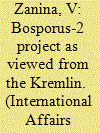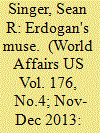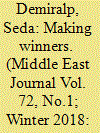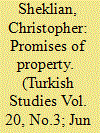|
|
|
Sort Order |
|
|
|
Items / Page
|
|
|
|
|
|
|
| Srl | Item |
| 1 |
ID:
154940


|
|
|
|
|
| Summary/Abstract |
A strong sense of victimhood, a discourse of social suffering, and complementary bodily performances, which mobilize rancor, resentfulness, and revengefulness, are fundamental elements of Turkish-Islamist ideology. This article discusses the political dynamics and implications of such assertions of victimhood in the Turkish context. To underscore these dynamics, it analyses the role of the logic of pain in the subject formation of Turkish-Islamist identity and how this logic has been revitalized by constitutive and hegemonic social imagination, and circulated and intensified by a reactionary mood. Additionally, it aims to expose how this reactionary mood profoundly depends on contradictory subjectification processes, which simultaneously involve mobilization of feelings of impotency, non-responsibility, self-pitying, and sublimation of power. This subject formation opens the way for identification with authoritarian figures in the Turkish case.
|
|
|
|
|
|
|
|
|
|
|
|
|
|
|
|
| 2 |
ID:
137318


|
|
|
|
|
| Summary/Abstract |
BOSPORUS' TRAFFIC will be reduced to zero," Prime Minister Recep Tayyip Erdogan of Turkey stated in April 2011 as he spoke to a thousands-strong Turkish audience, suggesting as an alternative to the current Bosporus a new "grandiose project," the Bosporus-2 (the official name being Kanal Istanbul).1 Raised in the run-up to the parliamentary elections, the question of the construction of the channel immediately after the victory of the ruling Justice and Development Party (AKP) risked being forgotten. However, from statements of the Turkish government ahead of the presidential election in August this year it became clear that work on the project continues and practical steps are already underway for its implementation.2 With some skepticism, however, Erdogan's plan upset the Turkish and world community over the issue of the legal status of the new strait and unnecessary fuss around the Straits of Bosporus and the Dardanelles.
|
|
|
|
|
|
|
|
|
|
|
|
|
|
|
|
| 3 |
ID:
125300


|
|
|
|
|
| Publication |
2013.
|
| Summary/Abstract |
On May 28th, around the same time Turkish Prime Minister Recep Tayyip Erdogan addressed the Justice and Development Party (AKP) delegation in Parliament, as he does most Tuesdays, police were ejecting protesters from Istanbul's Gezi Park. The previous day, environmentalists had begun gathering there to protest the cutting down of trees to make room for the reconstruction of the Halil Pasha Artillery Barracks, which stood on the same plot of land from the early 1800s until 1940. By the end of the week, the protests had grown in intensity, with over a hundred thousand demonstrators and police using tear gas and water cannons to control them. Clashes with police spread from the adjacent Taksim Square to other parts of the city, and later to eighty of Turkey's eighty-one provinces, with more than two million people participating in a movement that by the end of June left five dead and thousands injured. Istanbul alone suffered tens of millions of dollars worth of property damage.
|
|
|
|
|
|
|
|
|
|
|
|
|
|
|
|
| 4 |
ID:
157527


|
|
|
|
|
| Summary/Abstract |
This study focuses on the distribution of the costs and benefits of Turkey's urban policy. Since 2002, the Justice and Development Party (AKP) government has embraced an ambitious form of capitalism that privatized the benefits of urban transformation while socializing its costs. The government has also adopted populist strategies that enhanced its political support among upper- and lower-income groups and left urban transformation's costs to fall disproportionally on the middle class.
|
|
|
|
|
|
|
|
|
|
|
|
|
|
|
|
| 5 |
ID:
165300


|
|
|
|
|
| Summary/Abstract |
The policies of the Turkish Justice and Development Party (AKP) towards religious minorities exhibits a fundamental ambiguity. Though the AKP has supported a number of high-profile changes in policy towards Armenians and other non-Muslim minorities, the party has left the underlying legal structure intact. This article describes developments in the treatment of non-Muslim vakıfs (often translated at ‘religious foundations’) under the AKP, specifically the restoration of the Holy Cross Armenian Cathedral on the island of Akdamar and the reopening of the Surp Giragos Armenian Church in Diyarbakır. Using these examples, the article demonstrates how the tension between changing policy and enduring legal structure points to an ‘ambiguous attitude’ on the part of the AKP towards Turkey’s religious minority populations.
|
|
|
|
|
|
|
|
|
|
|
|
|
|
|
|
| 6 |
ID:
120755


|
|
|
|
|
| Publication |
2013.
|
| Summary/Abstract |
This article aims to make a contribution to the axis-shift debate by quantitatively analyzing whether Turkey's United Nations General Assembly (UNGA) votes displayed any shifting patterns from the West to the East during the Justice and Development Party (AKP) government era. Examining data on the UNGA's most important resolutions from 2000 to 2010, the article finds no evidence supporting the axis-shift claim. However, there is some empirical evidence indicating that Turkey, at least in the UNGA, became a more independent actor on regional issues but at the same time adopted a more pro-European Union attitude on global issues during the AKP era.
|
|
|
|
|
|
|
|
|
|
|
|
|
|
|
|
| 7 |
ID:
126268


|
|
|
|
|
| Publication |
2014.
|
| Summary/Abstract |
For much of last year, Turkey's economy seemed almost on top of the world. In May, as huge construction projects moved ahead, Ankara paid off its remaining debt to the International Monetary Fund, ending what seemed to many Turks a long history of humiliation. The country received an encouraging investment-grade rating, and foreign funds poured in like never before.
|
|
|
|
|
|
|
|
|
|
|
|
|
|
|
|
| 8 |
ID:
120978


|
|
|
|
|
| Publication |
2013.
|
| Summary/Abstract |
Since the election of the Justice and Development Party (AKP) in 2002, Turkey has become the subject of increased attention from the US foreign policy community. Schools of thought range from those who argue that Turkey is "turning away from the West" to those who suggest that Turkey is pursuing a more autonomous foreign policy. One of the few things on which these schools of thought agree is that, if they are correct, we should be able to find these patterns in public opinion. Analyzing data from the Pew Global Attitudes Project, we find some differences in attitudes based on political party affiliation, income and education, but the results generally refute the argument that Turks see a fundamental choice between East and West in their foreign policy or that supporters of the AKP have fundamentally different international outlooks. Taken together, these results have important implications for US policymakers.
|
|
|
|
|
|
|
|
|
|
|
|
|
|
|
|
| 9 |
ID:
114871


|
|
|
|
|
| Publication |
2012.
|
| Summary/Abstract |
This paper presents some related processes in Turkey which have been initiated or influenced by the World Bank's execution of the Social Risk Mitigation Project (SRMP). It argues that the Justice and Development Party (AKP), as a party that redefined social assistance as charity by incorporating Islamic values with neo-liberalism, benefited from the SRMP for increasing its public support. It also demonstrates how the AKP's use of this project for its political aims led to some unintended consequences, causing the production and spreading of discourses about the poor, the Kurdish population and the emergence of a culture of poverty in the country.
|
|
|
|
|
|
|
|
|
|
|
|
|
|
|
|
|
|
|
|
|